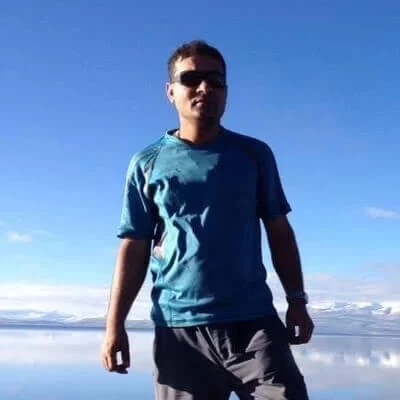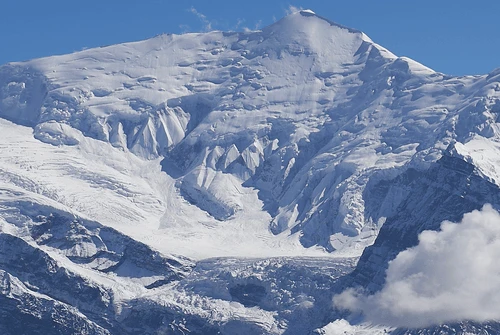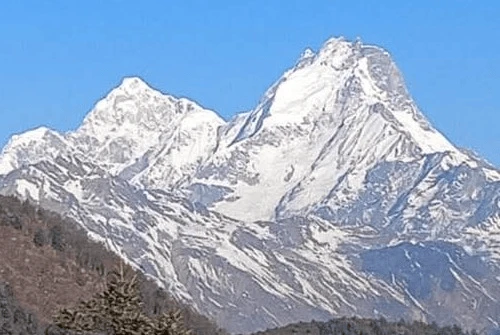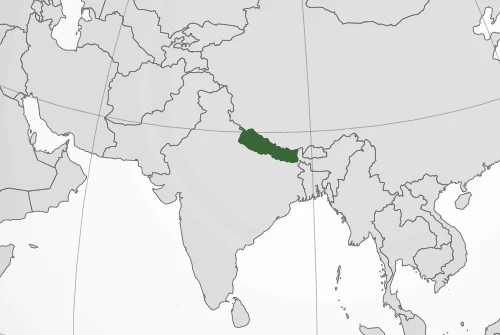Normal EBC With Gokyo Trek V/S Everest Three Pass Trek
Normal EBC With Gokyo Trek - An Introduction
The Normal Everest Base Camp (EBC) Trek with the Gokyo Lakes Extension is a breathtaking journey through the heart of the Nepal Himalayas. The iconic Everest Base Camp experience is combined with the serene beauty of the Gokyo Lakes region on this trek. It is an adventure that promises breathtaking scenery, cultural immersion, and a deep connection with Mount Everest, the world's tallest mountain.
This trek starts in Kathmandu, where trekkers prepare for their high-altitude journey into the Everest region. The trek takes you through lush forests, beautiful Sherpa villages, and across suspension bridges over thundering rivers as it progresses. The trail gradually ascends, providing breathtaking views of towering peaks, including the legendary Mount Everest. The visit to Everest Base Camp, where mountaineers from all over the world gather to pursue their dreams of reaching the summit, is undoubtedly the highlight of this trek. You'll feel a profound sense of awe and accomplishment standing at the base of Everest.
Furthermore, the extension to Gokyo Lakes adds another level of beauty to the journey. The Gokyo region is known for its turquoise glacial lakes surrounded by towering peaks. Climbing Gokyo Ri, a nearby peak, provides a panoramic view of Everest, Lhotse, Makalu, and Cho Oyu, making it a must-see for any trekker. Throughout this adventure, you will have opportunities to interact with the friendly Sherpa people, learn about their culture, and sample traditional Nepali cuisine. The Normal EBC with Gokyo Trek is more than just a trek; it's a transformative experience that leaves trekkers with lasting memories of the Everest region's unparalleled beauty and rich culture.
Everest Three-Pass Trek - An Introduction
The Everest Three-Pass Trek is an exciting yet challenging adventure that takes trekkers deep into the Nepal Himalayas. This extraordinary journey is renowned for its difficult nature and the opportunity to conquer three high mountain passes while exploring remote and less-visited areas of the Everest region. The trek begins in Kathmandu, Nepal's bustling capital, where trekkers prepare for their incredible ascent into the Everest region. As the journey progresses, it passes through dense rhododendron forests, picturesque Sherpa villages, and suspension bridges spanning rushing glacial rivers. The gradual ascent of the trek allows trekkers to acclimate to the increasing altitude as they travel deeper into the Himalayas.Trekkers will cross three high mountain passes: Kongma La, Cho La, and Renjo La. These passes provide stunning views of towering peaks such as Mount Everest, Lhotse, Makalu, and Cho Oyu, among others. Conquering these passes gives you a tremendous sense of accomplishment and is a highlight of the journey. Furthermore, this trek takes you through remote villages such as Chhukung, Thame, and Lungden, providing an off-the-beaten-path experience. These less-visited areas offer an exceptional opportunity to immerse yourself in the local culture and interact with the warm and welcoming Sherpa communities. You'll learn about their traditional way of life, including ancient customs and practices.
Normal EBC With Gokyo Trek V/S Everest Three Pass Trek Major Key Highlights of Two Destinations
Everest Base Camp: The trek takes you to the world-famous Everest Base Camp, where climbers prepare for their ascent of Mount Everest. You'll have the chance to see the Khumbu Icefall and the majestic Everest up close.
Gokyo Lakes: The trek also includes a visit to the Gokyo Lakes, a series of high-altitude glacial lakes surrounded by towering peaks. The turquoise waters of these lakes are incredibly scenic.
Gokyo Ri: You can climb Gokyo Ri, a nearby peak, for a stunning panoramic view of the Everest region, including Everest itself.
Three High Passes: This trek is known for crossing three high mountain passes: Kongma La Pass, Cho La Pass, and Renjo La Pass. These passes offer breathtaking views and a sense of adventure.
Remote Villages: You'll visit less-touristy villages like Chhukung, Thame, and Lungden, experiencing the local culture and lifestyle.
Varied Scenery: The trek offers diverse landscapes, including glaciers, valleys, high-altitude lakes, and forests.
Overall both the Normal Everest Base Camp (EBC) with Gokyo Trek and the Everest Three Pass Trek provide unique and unforgettable experiences in the Nepal Himalayas. Regardless of your choice between the Three Passes Trek and the Everest Base Camp Trek, you'll be treated to breathtaking mountain panoramas and the chance to deeply engage with the local culture and lifestyle of the region.
Total Distance Of Normal EBC With Gokyo Trek V/S Everest Three Pass Trek
The total distance covered in the Normal Everest Base Camp (EBC) Trek with the Gokyo Lakes highlighting and the Everest Three Pass Trek can vary slightly depending on the route taken and side trips. Here's an estimate for each journey:
Normal EBC with Gokyo Trek:
This trek's total distance is estimated to be between 70 and 80 miles (112 to 128 kilometers).
Without the Gokyo Lakes extension, the EBC portion is roughly 38 to 43 miles (61 to 69 kilometers).
The Gokyo Lakes extension adds about 30 miles (48 kilometers) to the journey.
Everest Three Passes Trek:
The Everest Three Pass Trek is typically 75 to 80 miles (120 to 128 kilometers) long.
This includes the extra distance required to pass through the three high mountain passes: Kongma La Pass, Cho La Pass, and Renjo La Pass.
It's important to note that these are rough estimates, and actual distances may vary depending on individual trekking routes, side trips, and itinerary variations offered by different trekking companies. Furthermore, the trekking experience includes difficult terrain, altitude changes, and the overall adventure of exploring the Everest region. Trekkers should be prepared for changing trail conditions and altitudes, which can make the journey physically challenging.
Duration Of Normal EBC With Gokyo Trek V/S Everest Three Pass Trek
The duration of both the Normal Everest Base Camp (EBC) Trek with the Gokyo Lakes extension and the Everest Three Pass Trek can be quite diverse, as it depends on various factors such as the specific trekking itinerary chosen, the pace of the trekker, and the inclusion of rest and acclimatization days.
For the Normal EBC with Gokyo Trek, it typically spans approximately 16 to 18 days. This timeline encompasses the journey from Lukla to the iconic Everest Base Camp, the exploration of the stunning Gokyo Lakes region, and the return journey. However, the actual duration can vary based on individual preferences, side trips, and variations in the trekking itinerary provided by different trekking operators.
On the other hand, the Everest Three Pass Trek usually takes a bit longer, averaging around 18 to 21 days. This extended duration is due to the challenging nature of the trek, which includes crossing three high mountain passes: Kongma La Pass, Cho La Pass, and Renjo La Pass. These passes offer breathtaking views but also demand more time and effort to navigate safely. Similar to the EBC with Gokyo Trek, the exact duration of the Everest Three Pass Trek can differ based on individual circumstances and trekking preferences.
In both treks, it's essential to consider factors such as rest days for acclimatization, potential delays due to weather conditions, and the need to adjust the itinerary to ensure a safe and enjoyable trekking experience.
Comparing Normal EBC With Gokyo Trek V/S Everest Three Pass Trek Routes
When the routes of the Normal Everest Base Camp (EBC), Gokyo Trek, and Everest Three Pass Trek are compared, different itineraries and trekking experiences develop.
Normal Everest Base Camp (EBC) Trek with Gokyo:
This trek starts with a flight to Lukla followed by a hike to Phakding. From there, it ascends through lush forests and picturesque Sherpa villages, including Namche Bazaar and Tengboche, with its famous monastery. Trekkers take acclimatization days in Namche and Dingboche. The journey continues to Lobuche, Gorak Shep, and eventually to Everest Base Camp, which provides iconic views of Mount Everest. Following that, the trail takes you to the enchanting Gokyo Lakes region via Dzongla. Trekkers can explore the pristine lakes and climb Gokyo Ri for breathtaking views. The journey back to Lukla takes a familiar route through Namche Bazaar.
Normal Everest Base Camp (EBC) Trek with Gokyo:
This trek starts with a flight to Lukla followed by a hike to Phakding. From there, it ascends through lush forests and picturesque Sherpa villages, including Namche Bazaar and Tengboche, with its famous monastery. Trekkers take acclimatization days in Namche and Dingboche. The journey continues to Lobuche, Gorak Shep, and eventually to Everest Base Camp, which provides iconic views of Mount Everest. Following that, the trail takes you to the enchanting Gokyo Lakes region via Dzongla. Trekkers can explore the pristine lakes and climb Gokyo Ri for breathtaking views. The journey back to Lukla takes a familiar route through Namche Bazaar.
In summary, while both treks follow a similar initial route and include visits to Everest Base Camp and the Gokyo Lakes, the Everest Three Pass Trek is much more difficult due to the inclusion of three high passes and a detour to Chhukung. The EBC with Gokyo Trek, on the other hand, includes an extension to the tranquil Gokyo Lakes. The trek you choose depends on your trekking experience, fitness level, and appetite for adventure, with each offering its distinct highlights and adventure.
Normal EBC With Gokyo Trek V/S Everest Three Pass Trek Itinerary
The itineraries for the Normal Everest Base Camp (EBC) Trek with the Gokyo Lakes extension and the Everest Three Pass Trek can vary slightly depending on the trekking company and specific preferences. Here's a general overview of the itineraries for both treks:
Normal EBC with Gokyo Trek Itinerary
Day 1:Arrival at Tribhuwan International Airport (TIA)
Day 2:Fly to Lukla – Trek to Phakding (2600 m): 3 to 4 hours walk
Day 3:Trek from Phakding to Namche Bazaar (3440 m/11,280 ft): 5-6 hrs
Day 4:Namche: Acclimatization & Rest: 5 to 6 hours walk
Day 5:Trek from Namche Bazaar to Tengboche (3860 m/12,660 ft): 5-6hrs
Day 6:Trek from Tengboche to Dingboche (4,360 m/14,300 ft): 5-6 hrs
Day 7:Acclimatization at Dingboche
Day 8:Trek from Dingboche to Lobuche (4940 m/16,207 ft): 4-5hrs
Day 9:Trek from Lobuche to Gorak Shep (5170 m/16,961ft) - Everest Base Camp (5364 m/17,594 ft) - Gorak Shep: 8-9 hr
Day 10:Trek from Gorak Shep to Kala Patthar (5545 m/18,192 ft) - Pheriche [4280 m/14,070 ft]: 8-9 hrs
Day 11:Trek from Pheriche to Namche Bazaar (3440 m/11,280 ft): 7-8 hrs
Day 12:Trek from Namche Bazar to Lukla
Day 13:Lukla to Kathmandu
Day 14:Departure day
Everest Three Pass Itinerary
The Everest Three Pass Trek shares a similar initial itinerary with the EBC Trek but diverges after Namche Bazaar:
Day 1:Arrival in Kathmandu
Day 2:Trek Preparations
Day 3:Fly to Lukla, Trek to Phakding
Day 4:Phakding to Namche Bazaar
Day 5:Namche Bazaar - Rest and Acclimatization
Day 6:Namche Bazaar to Tengboche
Day 7:Tengboche to Dingboche
Day 8:Dingboche - Acclimatization and Rest
Day 9:Dingboche to Chhukung, Climb Chhukung Ri
Day 10:Cross to Kongma La Pass, Trek to Lobuche
Day 11:Lobuche to Gorak Shep, Visit Everest Base Camp
Day 12:Gorak Shep to Kala Patthar, then to Lobuche
Day 13:Lobuche to Dzongla
Day 14:Trek to Gokyo via Cho La Pass
Day 15:Rest Day in Gokyo: Climb Gokyo Ri, Tour 4th and 5th Gokyo Lakes
Day 16:Gokyo to Marlung via Renjo La Pass
Day 17:Marlung to Namche Bazaar
Day 18:Namche Bazaar to Lukla
Day 19:Lukla to Kathmandu
Day 20:Departure to Your Country
Difficulties of Normal EBC With Gokyo Trek V/S Everest Three Pass Trek Routes
The Everest Base Camp (EBC) trek with the Gokyo option and the Everest Three Passes trek are both difficult and adventurous journeys in Nepal's Everest region. Each route has its own set of challenges and distinguishing features. I'll compare the difficulty of these two treks here:
Everest Base Camp Trek with Gokyo:
Altitude: One of the most difficult aspects of this route is the altitude. Both Gokyo and Everest Base Camp are located at high altitudes (more than 5,000 meters or 16,000 feet), and acclimatization is essential to avoid altitude sickness.
Gokyo Ri: To get to Gokyo, you must first ascend Gokyo Ri, a difficult climb with spectacular views of Everest, Lhotse, and Cho Oyu. This can be a physically demanding activity.
Crossing Cho La Pass (5,420 meters or 17,782 feet): The trek includes a crossing of Cho La Pass (5,420 meters or 17,782 feet), which requires basic mountaineering skills and can be dangerous in bad weather.
While this trek is less crowded than the standard EBC route, it also means that there are fewer resources and facilities along the way.
Everest Three Passes Trek:
High Passes: As the name implies, this trek will take you through three high passes: Renjo La (5,360 meters), Cho La (5,420 meters), and Kongma La (5,535 meters). Because of the steep ascents, technical terrain, and unpredictable weather, these passes can be difficult.
Acclimatization and Altitude: The Three Passes trek takes you to high altitudes, so proper acclimatization is essential. You must be prepared to deal with the effects of altitude.
Crossing Cho La Pass (5,420 meters or 17,782 feet): The trek includes a crossing of Cho La Pass (5,420 meters or 17,782 feet), which requires basic mountaineering skills and can be dangerous in bad weather.
Remote and Less Crowded: While this trek is less crowded compared to the standard EBC route, it also means fewer resources and facilities along the way.
Remote and Rugged Terrain: This trek takes you to less-visited and more remote areas of the Everest region. In comparison to the standard EBC trek, the terrain can be rugged, and the trails are less well-maintained.
Longer Duration: The Three Passes trek is longer than the standard EBC trek, typically lasting 16-20 days. This necessitates greater physical and mental endurance.
Preparation of Normal EBC With Gokyo Trek V/S Everest Three Pass Trek
Preparation for Normal EBC with Gokyo Trek:
- Physical Fitness: You should be in good physical shape, as you'll be trekking for several hours a day at high altitudes. Cardiovascular endurance, leg strength, and stamina are essential. Start a fitness regimen several months in advance, including hiking and aerobic exercises.
- Altitude Training: As both EBC and Gokyo are at high altitudes, it's crucial to prepare for altitude. If possible, spend a few days at a higher altitude before starting the trek to acclimatize.
- Gear and Equipment: Invest in appropriate trekking gear, including high-quality hiking boots, warm clothing, a good sleeping bag, and a backpack. Don't forget essential items like a water purification system, trekking poles, and a down jacket.
- Permits and Documentation: Obtain the necessary permits for the trek, including the Sagarmatha National Park entry permit and the TIMS (Trekkers' Information Management System) card. Ensure that your passport is valid for at least six months beyond your trek's end date.
- Travel and Accommodation: Book your flights to and from Lukla or Kathmandu well in advance. Make accommodation arrangements in Kathmandu and Lukla if required.
- Travel Insurance: Purchase comprehensive travel insurance that covers high-altitude trekking, emergency evacuations, and medical expenses.
Preparation for the Everest Three Passes Trek:
- Physical Fitness: The Three Passes trek is more demanding than the standard EBC trek. You need to be in excellent physical condition with a strong cardiovascular system, leg strength, and endurance. Consider incorporating high-altitude training if possible.
- Altitude Experience: Prior experience trekking at high altitudes is highly recommended. If you haven't trekked at high altitudes before, consider doing shorter treks in the Everest region or other high-altitude regions to familiarize yourself with the effects of altitude.
- Technical Skills: Learn basic mountaineering and trekking skills, such as how to use crampons and an ice axe, as you'll encounter glacier crossings and potentially icy conditions on the passes.
- Gear and Equipment: Similar to the EBC trek with Gokyo, invest in high-quality gear and equipment, and make sure you have additional layers of warm clothing and specialized equipment for high passes.
- Permits and Documentation: Obtain the necessary permits, including the Sagarmatha National Park entry permit and the TIMS card. Ensure that your passport is valid for at least six months beyond your trek's end date.
- Travel and Accommodation: Book your flights to and from Lukla or Kathmandu well in advance. Make accommodation arrangements in Kathmandu and Lukla if required.
- Travel Insurance: Ensure that your travel insurance covers high-altitude trekking, technical mountaineering sections, emergency evacuations, and medical expenses.
Choosing Between the Two: Normal EBC With Gokyo Trek V/S Everest Three Pass Trek
Normal EBC with Gokyo Trek is ideal if you want to experience both the Everest Base Camp and the Gokyo Lakes region while following a well-trodden path. It provides a blend of iconic Everest sights and cultural immersion, making it a great choice for a balanced adventure.
Everest Three Pass Trek is the choice for trekkers seeking a more challenging and less-crowded experience. If you're physically fit, experienced in high-altitude trekking, and crave adventure and solitude, this trek offers a unique opportunity to test your limits and explore remote areas.
In making your decision, it's crucial to factor in your personal trekking experience, physical fitness level, and the type of adventure you aspire to embark upon. Both trekking options present incredible prospects for immersing yourself in the Everest region's awe-inspiring landscapes and rich cultural heritage. Adequate preparation, proper acclimatization, and a thorough consideration of the physical demands involved are all essential aspects to contemplate before finalizing your choice.
We hope this blog assists you in deciding which trekking option is most suitable for you. Please don't hesitate to reach out via [email protected] [email protected] email for further details or inquiries



 based on 60 reviews
based on 60 reviews



